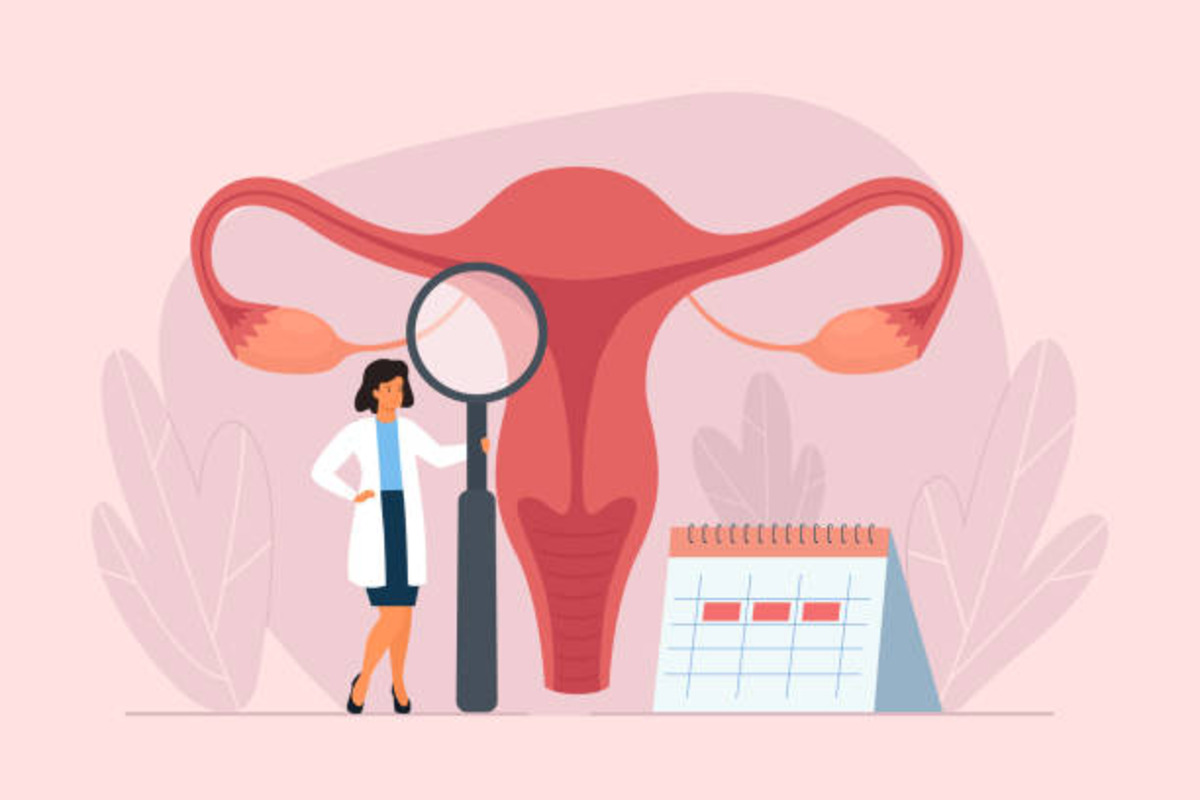How to Naturally Delay Your Period
The menstrual cycle is a natural and necessary process that happens in all females of reproductive age. Each month, a sequence of hormonal changes and physiological events occur to prepare the body for pregnancy. A menstrual cycle lasts approximately 28 days on average, however, this might vary from woman to woman.
The Menstrual Cycle Phases
The menstrual cycle is divided into four major periods, each of which is controlled by a distinct hormone:
Advertisement
- Menstrual Phase: The menstrual phase begins on the first day of menstrual bleeding. The uterus sheds its lining from the previous cycle during this time, resulting in menstruation.
- Follicular Phase: After the menstrual phase, the follicular phase begins. The pituitary gland secretes follicle-stimulating hormone (FSH), which causes follicles (fluid-filled sacs) to form in the ovaries. These follicles hold eggs and create estrogen as they expand.
- Ovulatory Phase: About halfway through the menstrual cycle, a rise in luteinizing hormone (LH) causes a mature egg to be released from one of the ovarian follicles. This is called ovulation, and it usually happens around day 14 of a 28-day cycle.
Luteal Phase: After ovulation, the empty follicle converts into the corpus luteum, which generates progesterone. Progesterone prepares the uterus for fertilized egg implantation.
Also, check out Tips to Manage Heat Rashes During Pregnancy.
Hormones Involved in Menstruation
Several major hormones are involved in the regulation of the menstrual cycle:
Advertisement
- Estrogen: Estrogen is produced largely during the follicular phase and is responsible for uterine lining thickening. It also aids in the release of LH, which causes ovulation.
- Progesterone: During the luteal phase, progesterone levels rise. It aids in the preservation of the uterine lining in preparation for a possible pregnancy. If fertilization does not occur, progesterone levels fall, resulting in uterine lining loss and the commencement of menstruation.
- Follicle-Stimulating Hormone (FSH): FSH stimulates the growth of ovarian follicles during the early stages of the menstrual cycle.
- Luteinizing Hormone (LH): Mid-cycle LH surges, triggering ovulation and egg release from the ovary.
Hormonal Balance and Its Importance
A healthy menstrual cycle depends on a well-balanced hormonal system. Hormonal abnormalities can cause missed periods, irregular periods, and other menstrual irregularities. Stress, nutrition, exercise, and certain medical problems can all affect hormone levels and menstrual regularity.
Understanding the menstrual cycle and its hormonal dynamics is critical for people trying to delay their period naturally. Individuals who understand the hormonal processes can make informed judgments regarding lifestyle changes and natural therapies to effectively manage their menstrual periods.
It is crucial to emphasize, however, that any attempts to alter the menstrual cycle should be undertaken with carefully and, if necessary, under the supervision of a healthcare practitioner.
Lifestyle Changes for Menstrual Delay
Delaying your period naturally may entail adopting lifestyle changes that may affect your hormonal balance and menstrual cycle.
While some lifestyle modifications may help to delay your period, individual reactions might vary, and not all approaches may work for everyone. Before attempting to change your menstrual cycle, always check with a healthcare practitioner. Consider the following lifestyle changes:
Dietary Modifications
Certain dietary changes may impact hormone levels and potentially postpone your period. Some women discover that eating particular meals or avoiding certain drugs might affect their menstrual cycles. However, there is limited scientific evidence to back these assertions, and the effects may differ between individuals. Consider the following dietary changes:
- Increasing Vitamin C Intake: Some feel that vitamin C has the ability to raise estrogen levels and interfere with progesterone synthesis. Citrus fruits, strawberries, broccoli, and bell peppers are all high in vitamin C.
- Herbal Teas: Certain herbal teas, such as chamomile and ginger tea, are thought to have minor effects on hormone balance and may help some people delay menstruation.
- Avoiding Spicy Foods: Some people believe that eating spicy foods can disrupt the menstrual cycle, however scientific evidence to support this claim is weak.
The Role of Exercise
Exercise has been shown to influence hormone levels and menstrual regularity. While moderate activity is typically good for your health, vigorous or excessive exercise can cause hormonal imbalances and disrupt your menstrual cycle. Consider the following to postpone your period:
- Limiting Intense Exercise: Delaying your period may be helped by temporarily limiting or adjusting intense workouts, especially around the time of expected menstruation.
- Yoga and Relaxation activities: Yoga and other relaxation activities can help manage stress, which may alter menstrual regularity indirectly.
Stress Reduction Techniques
Chronic stress has been shown to interrupt the menstrual cycle by affecting hormone levels. Incorporating stress-reduction measures into your daily routine may aid in the postponement of your period:
- Meditation and Mindfulness: Meditation and mindfulness practice can reduce stress and promote hormonal balance.
- Breathing Exercises: Deep breathing exercises can activate the relaxation response and aid in stress management.
- Engaging in Relaxing Activities: Engage in activities that provide you joy and relaxation, such as reading, being outside, or listening to soothing music.
Menstrual Cycle Tracking
When attempting to delay your period, it is critical to keep track of your menstrual cycle. Understanding your cycle’s timing allows you to plan properly. There are a variety of period-tracking applications available to help you forecast your next period and make informed decisions about postponing it.
Before adopting any lifestyle changes to delay your period, keep in mind that these strategies may not be suitable for everyone.
They are not intended to be a replacement for medical advice, and any substantial changes in your menstrual cycle should be explored with a healthcare expert. Furthermore, if you are thinking about delaying your period for a specific event or occasion, make sure you have enough time to attempt these strategies and evaluate their effects on your cycle.
Also, check out Women’s Horlicks Plus Price and Essential Facts.
Menstrual Delay Herbal Remedies and Supplements
While lifestyle changes might affect menstruation regularity, some people may look into using herbal remedies and supplements to naturally delay their cycles. Before utilizing any herbal remedies or supplements, you should proceed with caution and consult a healthcare expert, especially if you have underlying health concerns or are using drugs. The following are some of the most widely mentioned herbal therapies and supplements for menstruation delay:
Herbal Treatments
- Angelica Root (Dong Quai): Angelica root, also known as Dong Quai, is a traditional Chinese medicine plant used to control menstrual periods. When taken before the estimated period start date, some feel it may help delay menstruation. More research is needed, however, to determine its efficacy and safety.
- Raspberry Leaf: Raspberry leaf is frequently used to tone the uterus and improve female reproductive health in general. Some people use raspberry leaf tea or supplements to possibly postpone their periods.
- Yarrow: Astringent qualities of yarrow are known to help lower menstrual flow and delay periods. The scientific evidence supporting this notion, however, is sparse.
- Lemon Juice: Drinking lemon juice is sometimes recommended as a natural strategy to postpone menstruation. Although scientific data is scarce, it is thought to have a minor effect on hormone levels.
Additions
- Vitamin B6: Vitamin B6 is thought to play a role in hormonal balance and, in some situations, may be used to delay menstruation. However, too much B6 can cause nerve damage, so use supplements with caution and within the suggested levels.
- Nonsteroidal anti-inflammatory drugs (NSAIDs): NSAIDs, such as ibuprofen, are pain medications that can also decrease prostaglandin formation. Some women take NSAIDs a few days before their period to lower menstrual flow and somewhat postpone their cycles. However, because NSAIDs have potentially negative effects, this should only be done under physician supervision.
Precautions and Considerations for Safety
Before attempting any herbal cures or supplements to delay your period, see a healthcare practitioner first, as they may interfere with drugs or have bad effects on certain persons.
- Remember that herbal medicines and supplements are not regulated in the same way that prescription pharmaceuticals are, so their safety and efficacy may be unknown. Some herbal cures and supplements may have negative effects, allergic reactions, or conflict with other prescriptions you are already taking.
- Taking various herbal remedies or supplements at the same time without medical supervision increases the chance of harmful responses.
- Herbal cures and vitamins are not a guaranteed way to delay your period, and outcomes may vary from person to person.
Remember that menstrual delay is not a permanent solution, and any persistent anomalies in your menstrual cycle should be examined by a healthcare expert.
Understanding the dangers and advantages of herbal medicines and supplements might help you make more informed decisions about naturally controlling your menstrual period.
Methods of Natural Hormone Regulation
Understanding the significance of hormones in the menstrual cycle is critical when contemplating natural strategies to delay your period. Some hormone-based methods can be used to manage menstruation timing.
However, it is critical to understand their effects and potential hazards. Before attempting any hormone-based treatment, consult with a healthcare expert. Consider the following natural hormone-regulating approaches for menstruation delay:
Hormonal Contraception
Hormonal contraceptives are a popular strategy for managing menstrual cycles and delaying periods. Synthetic hormones are used in these birth control procedures to replicate or alter the body’s natural hormonal functions. Consider the following options:
- Combined Oral Contraceptives: These contraceptives contain both estrogen and progestin and are often used in 21-day cycles with a 7-day hormone-free gap. You can postpone your period until the end of the second pack by skipping the hormone-free interval and starting a fresh pack right away.
- Progestin-Only Pills: These pills, often known as mini-pills, contain only progestin. You can delay your period by skipping the hormone-free interval and starting a new pack right away, much like with combined oral contraceptives.
- Contraceptive Patch or Vaginal Ring: The contraceptive patch and vaginal ring function in the same way as combination oral contraceptives. You can use these tactics indefinitely to postpone your menstruation.
It is critical to consult with a healthcare practitioner before using hormonal birth control, as certain medical disorders and specific health considerations may alter their suitability.
Natural Progesterone Cream
Progesterone is a hormone that is essential for uterine lining maintenance during the menstrual cycle. Some women use natural progesterone cream to control their periods. They may delay menstruation by applying the cream throughout key phases of the menstrual cycle.
Natural progesterone cream usage necessitates careful monitoring and timing since improper application might disrupt the menstrual cycle and result in irregular bleeding.
Phytoestrogens
Phytoestrogens are plant chemicals that mimic estrogen in the body. They can be found in foods including soy products, flaxseeds, and legumes. Some women believe that increasing their consumption of phytoestrogens may help them manage their menstrual cycle and possibly postpone their periods.
However, there is limited scientific evidence that phytoestrogens can delay menstruation, and further research is needed in this area.
Menstrual Cycle Manipulation
Menstrual cycle manipulation can be performed by women who adopt natural fertility awareness-based approaches (FAM). Some women may be able to detect the fertile phase and arrange activities or events around their predicted period date by carefully tracking their basal body temperature, cervical mucus, and other fertility markers.
It should be noted that menstrual cycle modification with FAM is not always precise and necessitates a thorough awareness of one’s fertility indications. It is not for everyone and should be used with caution.
Natural hormone-regulating strategies may be used to postpone menstruation for specific dates or situations. However, each person’s reaction to these methods may differ, so it’s critical to approach them with caution and medical guidance.
In particular, hormonal birth control choices should be evaluated by a healthcare practitioner to guarantee their safety and acceptability based on specific health factors. Always prioritize your health and check with a healthcare expert before making natural menstrual cycle management options.
Also, check out Affordable Feminine Care: How Much Does Klovinal Cost in Nigeria?.
Menstrual Delay Toolkit
Delaying your period naturally necessitates preparation, monitoring, and making informed decisions. Consider using the following procedures in your menstrual delay toolkit to properly apply natural treatments for the menstrual delay:
How to Delay Your Period: A Step-by-Step Guide
- Understand Your Cycle: To determine the approximate date of your next period, use period-tracking software or a calendar to chart your menstrual cycle.
- Select Your Way: Determine whatever natural way of menstruation delay you want to attempt, whether it’s lifestyle changes, herbal therapies, vitamins, hormonal birth control, or menstrual cycle manipulation.
- Research and Consult: Thoroughly research the approach you’ve chosen and speak with a healthcare practitioner about its suitability for your specific health needs, as well as any potential hazards or side effects.
Planning Ahead
- Special Occasions: Determine the date of any impending special events or occasions for which you would like to postpone your period. Work backward from that date to determine the best time to begin your chosen strategy.
- Give Yourself Time to Adjust: Some natural approaches may take a few days or weeks to have an influence on your menstrual cycle. Plan ahead of time to provide yourself ample time to implement the approach and monitor its effectiveness.
Cycle Monitoring
- Track Your Menstrual Cycle: Even if you are seeking to delay your menstrual cycle, keep utilizing your period-tracking app or calendar to chart its advancement.
- Keep Track of Changes: Keep track of any changes in menstrual symptoms, such as cervical mucus, basal body temperature, or menstrual flow.
- Maintain Your Health: Keep an eye out for any changes in your overall health and well-being during the delay process. If you notice any unexpected symptoms, stop using the procedure and seek medical attention.
Keeping Up to Date and Adapting
- Be adaptable: Recognize that natural approaches for menstruation delay may not always produce the desired results. Be adaptable and ready to change your plans if necessary.
- Stay Informed: Keep learning about menstruation health, natural therapies, and hormonal balance. Being knowledgeable allows you to make the greatest decisions for your health.
- Know When to Stop: If you suffer negative effects or long-term alterations in your menstrual cycle, stop using the procedure and consult with a healthcare practitioner.
Being Patient and Understanding
- Individual Variability: Keep in mind that every person’s biology is different, and reactions to natural treatments for menstruation delay can vary. What works for one individual might not work for another.
- Practice Self-Compassion: Throughout the process, be patient and nice to yourself. Natural approaches may necessitate trial and error, so don’t be too hard on yourself if things don’t go as planned.
The menstrual delay toolkit walks you through a step-by-step process for using natural strategies for delaying your period. Remember that menstruation delay should be done with prudence, and that your health and well-being should come first.
Before attempting any new procedure, consult with a healthcare expert, and be aware of any changes in your body during the process. You may make better judgments about controlling your menstrual cycle naturally if you stay informed, patient, and adaptive.
Also, check out The Health Benefits of Onion Water.
Seeking the Advice of a Healthcare Professional
It is critical to obtain guidance and advice from a competent healthcare practitioner before attempting to delay your period using any natural means. Consultation with a healthcare expert helps you make informed decisions that are specific to your health requirements and circumstances. When seeking medical advice concerning a menstrual delay, keep the following points in mind:
Understanding Your Medical History
- Menstrual History Discussion: Give your healthcare provider precise information about your menstrual history, including cycle regularity and any past anomalies.
- Pre-Existing Medical illnesses: Inform your healthcare practitioner if you have any pre-existing medical illnesses, such as polycystic ovary syndrome (PCOS), thyroid disorders, diabetes, or any other pertinent health difficulties.
- Drugs and Allergies: Provide a detailed list of all drugs, supplements, or herbal treatments you are presently taking, as well as any allergies you are aware of.
Investigating Menstrual Delay Treatment Options
- Natural Methods Discussion: Declare openly your desire to delay your period utilizing natural techniques such as lifestyle changes, herbal remedies, vitamins, or hormonal birth control.
- Weighing the Risks and Benefits: Your healthcare practitioner may assist you in understanding the potential risks and benefits of each treatment while taking your health state and particular needs into consideration.
Precautions for Safety and Medical Supervision
- Assessing Suitability: Your healthcare expert can assess whether menstrual delay treatments are safe and appropriate for you based on your medical history and current health.
- Monitoring Your Health: During the delay period, your healthcare professional can assist you in monitoring any changes in your menstrual cycle or overall health.
Assessing Underlying Issues
- Identifying Hormonal Imbalances: A healthcare practitioner can evaluate any hormonal imbalances or medical disorders that may be interfering with your menstrual cycle and, if necessary, give appropriate therapy.
- Addressing Underlying Concerns: If you are having irregular periods or other menstrual problems, your healthcare practitioner can look into potential underlying causes and give appropriate treatment.
Recognizing Natural Methods’ Limitations
- Examining Success Rates: Your healthcare expert can give you realistic expectations about the effectiveness of natural menstrual delay treatments.
- Thinking About Alternative Approaches: If natural techniques aren’t appropriate or effective for your individual case, your healthcare practitioner can look into other possibilities, such as hormone-regulating drugs.
Maintaining Open Communication
- Feel free to ask questions or seek clarification about the methods, any adverse effects, or any concerns you may have.
- Inform Your Healthcare Provider: If you notice any changes in your health or menstrual cycle during the delay period, notify your healthcare provider right away.
Consulting a healthcare practitioner is an important step in managing your menstrual cycle responsibly and contemplating natural methods to delay your period.
A healthcare expert can provide vital insights, analyze your specific health needs, and direct you to safe and appropriate options. Remember that your health and well-being are paramount, and making informed decisions with medical supervision is critical for a successful conclusion.
Precautions and Potential Side Effects
Attempting to delay your period, like any other intervention involving the menstrual cycle, comes with dangers and considerations. Throughout the process, it is critical to prioritize your health and well-being. Here are some measures to take and potential adverse effects to be aware of when attempting to delay your period naturally:
Precautions
- Consult a Healthcare expert: Before attempting any natural techniques for menstruation delay, consult a trained healthcare expert. They can examine your specific health needs and advise you on the best course of action.
- Recognize Individual Health Factors: Think about your medical history, current health conditions, and medication use. Specific natural treatments for menstrual delay may be contraindicated by certain medical problems or drugs.
- Avoid Using Several Methods Trying various natural approaches at the same time can result in unforeseen results and potential interactions. It is preferable to use only one approach at a time and only under the supervision of a medical professional.
Potential Side Effects
- Hormonal Imbalance: Changing the hormonal balance might result in side effects such as irregular bleeding, mood swings, and breast soreness.
- Gastrointestinal disorders: Some herbal medicines or supplements may induce gastrointestinal disorders such as stomach distress or diarrhea.
- Allergic Reactions: Certain herbs and supplements can cause allergic reactions in some people.
- Fertility Impact: Long-term or regular use of some methods, such as hormonal birth control, may have a temporary effect on fertility following withdrawal.
- Medication Interaction: Some herbal remedies or supplements may interfere with the pharmaceuticals you are taking, lowering their effectiveness or producing unpleasant consequences.
Recognizing When to Stop
- Keep an eye on your body: Keep a watchful eye on your menstrual cycle, overall health, and any bad responses during the delay process.
- Discontinue if Necessary: If you have persistent ill effects, unusual bleeding, or deterioration in your health, stop using the procedure immediately and seek medical help.
- Natural Methods as a Temporary Solution: Natural methods for menstrual delay should be utilized as temporary solutions for specific occasions or events. Manipulation of the menstrual cycle over an extended period of time or on a regular basis might disturb its natural rhythm and lead to additional health problems.
- Addressing menstruation Irregularities: If you have irregular periods or other menstruation difficulties on a regular basis, see a healthcare practitioner to address any underlying causes and receive appropriate treatment.
- Emphasizing Individual Variability: It is critical to understand that individual responses to natural menstrual delay strategies can vary greatly. What works for one individual might not work for another. As a result, it is critical to approach the procedure with patience and an open mind.
When seeking to naturally delay your period, safety should be a major priority. Consultation with a healthcare practitioner is essential to ensure that you choose the best strategy for your specific health needs.
Be aware of possible adverse effects and take the required precautions. Remember that natural techniques for menstrual delay should only be used sparingly and as a last resort. Throughout the process, always prioritize your health and well-being.
Frequently Asked Questions about Natural Period Delay Methods
Many questions may emerge when researching natural strategies to delay your menstruation. Here are some commonly asked questions (FAQs) with evidence-based answers to common concerns:
Are natural menstrual delay treatments safe?
When used properly and under the supervision of a healthcare expert, natural techniques for menstruation delay can be safe. Individual reactions may vary, and certain strategies may not be appropriate for everyone. It is critical to consult with a healthcare expert to verify safety and proper usage.
Can simple lifestyle changes effectively delay my period?
Lifestyle changes such as dietary changes, stress management, and moderate exercise can all have an impact on menstruation regularity. While they may be beneficial for certain people, their effectiveness in greatly postponing a period may vary. Combining lifestyle changes with other natural treatments may result in better results.
What herbal medicines are useful for menstruation irregularities?
Some herbal treatments, such as angelica root (Dong Quai), raspberry leaf, and yarrow, are thought to have menstrual effects. However, there is limited scientific evidence to support their usefulness, and more research is required. Before utilizing any herbal therapies, always consult with a healthcare practitioner.
Can birth control pills be used just to delay menstruation?
When used consistently without a hormone-free time, hormonal birth control pills can be used to delay menstruation. They are, however, primarily intended for contraceptives and other medical objectives. Using birth control just to delay menstruation should be discussed with a healthcare practitioner to assess potential side effects and dangers.
Are there any risks to delaying my period?
While natural techniques for menstruation delay are generally well-tolerated, they do have dangers and adverse effects. These may include hormonal abnormalities, irregular bleeding, and pharmaceutical interactions. It is critical to monitor your health and discontinue the method if unpleasant consequences develop.
Can I delay my period if I have a medical condition?
Before attempting to delay your period, check with a healthcare expert if you have an underlying health issue or are taking drugs. Certain natural approaches may not be appropriate or safe for people who have certain health issues.
How long can I delay my menstruation naturally?
The length of the menstrual delay varies according to the method utilized and the individual reaction. Some methods may delay menstruation somewhat, while others may delay it by a few days or more. It is critical not to rely on natural approaches for long periods of time or as a regular habit.
Can I delay my period to attend an important event?
If you have an impending important event or occasion and want to postpone your period, it is best to plan ahead of time and consult with a healthcare practitioner. Keep in mind that natural approaches may not always guarantee precise findings and that individual responses can vary.
Is there an age limit for utilizing natural methods to delay my period?
Certain hormonal birth control techniques may have age restrictions. Minors and teenagers should seek medical advice and, if necessary, include a parent or guardian in decision-making.
Understanding the frequently asked questions about natural menstrual delay methods can help you make informed decisions and manage your menstrual cycle responsibly.
Always get specific advice from a healthcare practitioner and examine the potential dangers and advantages of any treatment you pick. Throughout the process, prioritize your health and well-being.
Final Thoughts
Some people who want to control their menstrual cycles for specific events or occasions may find that naturally delaying their period is a viable choice. However, it is critical to approach these procedures with caution and a focus on your health and well-being. This guide’s important takeaways are summarized below:
- Know Your Menstrual Cycle: Learn about the phases of your menstrual cycle, the hormones involved, and the frequency of your periods. Using apps or calendars to track your menstrual cycle can help you predict and plan for your next periods.
- Obtain the Advice of a Competent Healthcare Practitioner: Before using any natural techniques for menstruation delay, obtain the advice of a competent healthcare practitioner. Your healthcare professional can evaluate your specific health needs, offer appropriate solutions, and assure your safety throughout the process.
- Select Your Method Wisely: There are a variety of natural options for delaying your period, such as lifestyle changes, herbal therapies, supplements, hormonal birth control, and menstrual cycle manipulation. Each method has risks and implications, so make informed decisions with professional assistance.
- Plan Ahead: If you have an important event or occasion coming up, plan ahead of time to provide yourself adequate time to implement and monitor the efficiency of the strategy you have chosen.
- Keep Track of Your Cycle: During the delay period, keep track of your menstrual cycle. Keep an eye out for any changes in your menstruation symptoms, overall health, or any adverse effects.
- Be Patient and Flexible: Recognize that individual reactions to natural approaches can differ. Be patient with the process and be ready to change your plans if necessary.
- Safety First: Throughout the menstrual delay process, prioritize your health and well-being. If you notice any negative consequences or strange symptoms, stop using the procedure.
- Temporary Solution: Natural treatments for menstrual delay should only be utilized for short periods of time. Long-term or frequent manipulation of your menstrual cycle may have an impact on your overall health.
- Maintain Your Knowledge: Continue to educate yourself on menstrual health, natural therapies, and hormonal management. Being knowledgeable allows you to make the greatest decisions for your health.
Menstruation is a natural physical process, and it is reasonable to want to postpone it for convenience or personal reasons. Understanding and accepting your menstrual cycle can help you manage it in a healthy and informed manner. Always prioritize your health, seek professional advice, and make responsible choices when it comes to naturally controlling your menstrual cycle.
Before you go, check out The Amazing Health Benefits of Dates.






